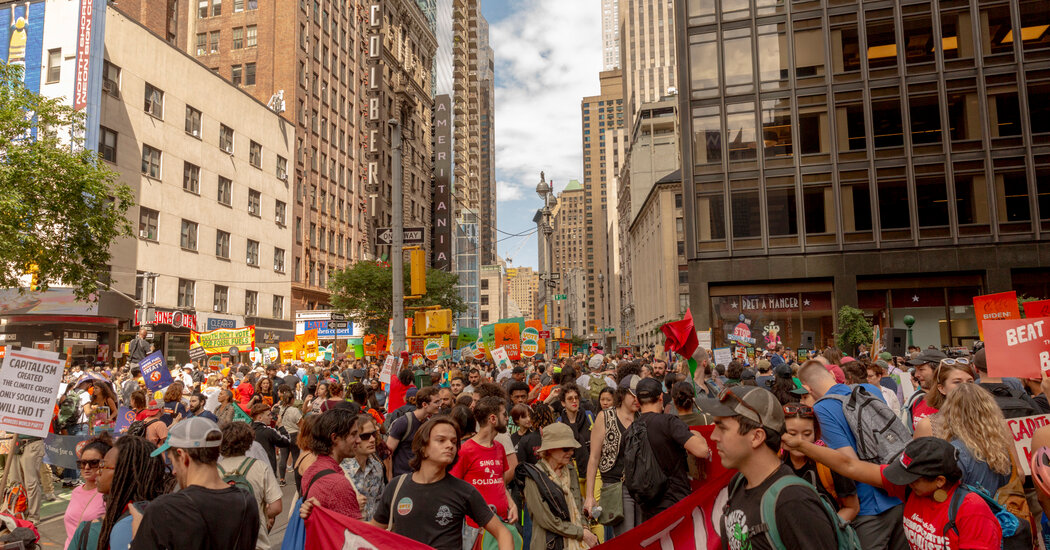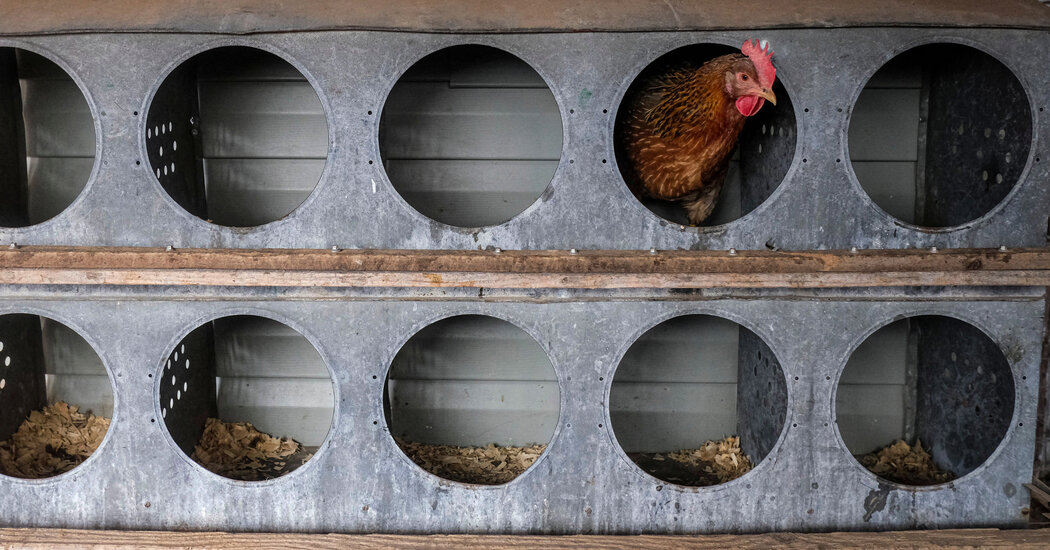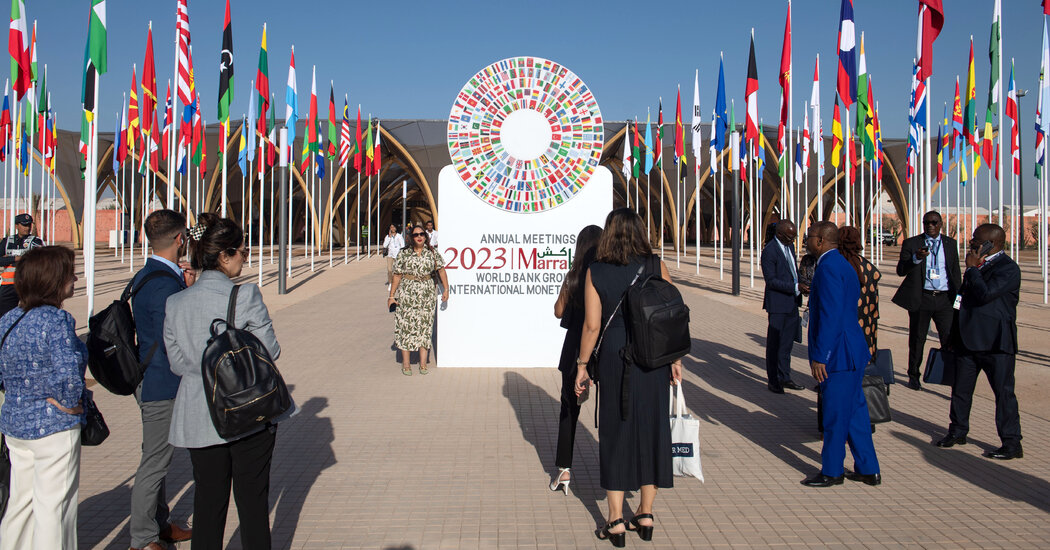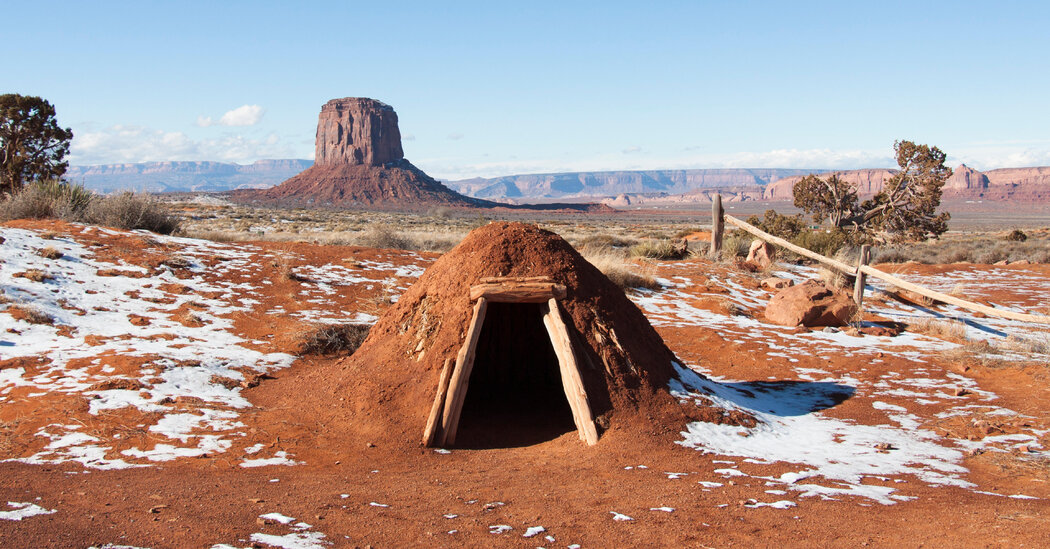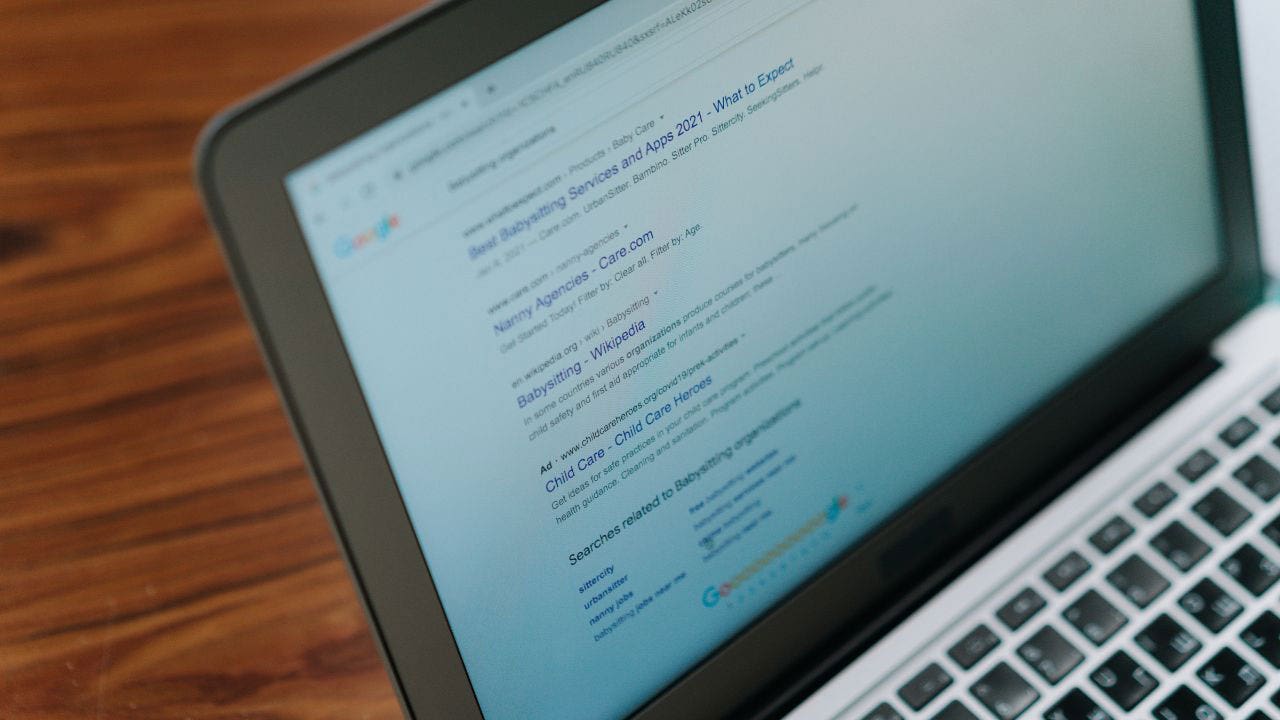This article is part of our special section on the Climate Forward event that will include policy and climate leaders from around the world.
The urgent need to address the conditions that are causing climate change — and to lessen the impact as temperatures climb and environmental catastrophes mount — has drawn widespread engagement from governments, politicians, industries, scientists, advocacy groups and concerned citizens. Leaders from many of the fields will be speaking, presenting and discussing their efforts at The New York Times Climate Forward event in New York on Thursday. We asked a sampling of participants to reply in advance to three questions about the state of the response to the environmental challenges. Their answers, which have been edited and condensed, are included here.
What is the single-biggest obstacle to having a meaningful effect on climate change?
Pedro J. Pizarro: President and chief executive, Edison International, a public utility holding company
Insufficient speed. We need more urgency. The U.S. electric power industry has reduced emissions 36 percent over the last 18 years — more than any other sector. We need to see more across all sectors. Our research in California shows the pace of deployment in all aspects of the clean energy transition must dramatically increase. This is true nationwide, too. The biggest need right now is the development of emerging technologies like offshore wind, geothermal, nuclear and carbon capture and storage — coupled with siting and permitting reform to enable transmission. We’ve come far, yes, but we must go further, faster.
Anthony Myint: Executive director, Zero Foodprint, a food and agricultural nonprofit; and co-founder, Mission Chinese Food
Our current political and economic institutions do not incentivize direct action. In fact, they often make it more difficult to do the work that we need to do to scale up natural climate solutions. Society can sidestep those barriers through innovative financing mechanisms and public-private collaborations that create frameworks for collective economic action. We must create simple, accessible pathways for every business, every person and every government to invest in the transformative solutions already making progress. Simple programs like collecting $1 a month on the energy bill or committing 1 percent from purchases to climate action build those pathways.
Ebony Twilley Martin: Executive director of Greenpeace USA
The No. 1 driver of the climate crisis is the production of fossil fuels like oil and gas, but the biggest obstacle we face in changing it is that our democracy is being dismantled in front of our eyes. There has been a noticeable, purposeful escalation of efforts to criminalize and silence peaceful protest, dissent, and advocacy in recent years. Unfortunately, these laws have a disproportionate impact on the same Black and Brown communities who are most impacted by Big Oil’s pollution and discrimination of all kinds. Historically excluded from decision making that impacts communities like mine, peaceful protest and expressing dissent are some of the most important tools we have to advocate for the world we deserve. Our democracy should work for the people. Americans don’t want to live like this — we deserve a green, just and joyful planet.
Gina McCarthy: Former national White House climate adviser and administrator of the Environmental Protection Agency
Whether it’s a church in central Pennsylvania going solar or a community college in Nebraska installing E.V. chargers, we’re already seeing real economic and health benefits to communities across red and blue states thanks to the passage of the Inflation Reduction Act (I.R.A.). So now is the time to reach out to people in communities all across America to [get] them excited about the clean energy transition because it is not just possible, it’s happening. All we have to do is make sure people are aware of and taking advantage of the enormous tax credits and rebate opportunities in the I.R.A. that will help families save money, grow good paying clean energy jobs, clean up our air, and transform our economy in ways that make all of us safer, healthier and more secure.
Calvin Butler: President and chief executive, Exelon, a public utility company
The greatest obstacle that must be overcome is finding alignment around immediate, concerted action among broad and diverse stakeholders. The ambition set by national policy must be matched with an unprecedented investment in technology, at a pace that does not create further societal inequities. With recent federal action we’re off to a good start, but more must be done. As we consider the uneven geographical distribution of resources, we need an equitable transition that balances geopolitical and socio-economic considerations.
José Andrés: Chef, humanitarian and founder of World Central Kitchen
We fail to invest in local food systems. In the aftermath of climate disasters, we must listen to the needs of those impacted and empower local solutions that put food at the center of recovery. Food has the power to heal people and rebuild communities, but if food is not prioritized, we will only continue providing unsustainable aid rather than investing in fixing the root causes of hunger and poverty. World Central Kitchen, the emergency response nonprofit I created after the 2010 Haiti earthquake, is leading with this approach in places from Hawaii to Morocco to Ukraine. I hope we’re able to influence how governments, bigger N.G.O.s, and U.N. agencies do their work too.
Michael Bloomberg: U.N. special envoy on climate ambition and solutions; founder of Bloomberg L.P. and Bloomberg Philanthropies; former mayor of New York City
The data is clear that we need to stop burning coal, which is the single largest contributor to climate change. We’ve made enormous progress in the United States and Europe — working with the Sierra Club, our foundation has helped retire 70 percent of all U.S. plants since 2010 — but the global north must do more to help the global south replace coal with clean energy, and our foundation is working to do that in Africa, Asia and Latin America.
Rev. Lennox Yearwood Jr.: President and chief executive, Hip Hop Caucus
The single biggest obstacle to having a meaningful effect on climate change is the narrative that nature and humanity are disconnected or separate. While the Earth’s climates and ecosystems are changing, people like you and me are challenged with the effects of those changes. Climate change weighs hardest on Black, Latinx and Indigenous folks and yet their lived experiences, stories of devastation and survival, and solutions are often left out of climate conversations. That’s why I often say that climate justice is racial justice and racial justice is climate justice. We must begin to center the human impact of climate change and understand how it intersects with all aspects of our daily lives.
Jason Grumet: Chief executive, American Clean Power Association
The last year has dramatically accelerated the transition to clean energy. Over the last 12 months alone, private sector investment in building out new clean energy resources in the United States exceeded the combined clean power investment for the prior eight years. The bad news is that technology innovation is not being matched by innovation in federal, state and local decision making, especially around approving transmission lines that are required to connect clean energy production to major manufacturing and population centers.
If you had to pick one thing that you would be allowed to do unilaterally to slow climate change, what would it be?
Pedro J. Pizarro
I would significantly expand the interstate, high-capacity transmission system across the United States to connect renewable-rich regions to urban centers. This would help support economywide emissions reductions while bolstering grid resilience against climate impacts. This would also have an almost immediate impact and accelerate the transition to a clean energy economy.
Anthony Myint
Make regenerative agriculture the norm! Ensuring that farmers have the knowledge, resources and community support to farm with nature is an optimistic, no-regrets climate solution. This isn’t a scenario that requires us to give up things we enjoy and in an attempt to do less harm. This is a hopeful opportunity to mainstream a win-win-win solution that benefits farmers, corporations, and society as a whole. We already possess the tools necessary for our communities to build resilience, improve water cycles, increase biodiversity, nutrient density and farmer prosperity. Let’s invest in them at scale.
Ebony Twilley Martin
We have 100-year floods occurring every five years, fires sweeping across the country, and respiratory illnesses are on the rise. It’s no wonder that two-thirds of Americans want action on climate change. If I could do one thing unilaterally to slow climate change, it would be to end the era of fossil fuels like coal, oil, and gas. We have all the technology we need to transition to a clean, green economy that does not sacrifice people or the planet. The science is very clear: we cannot keep our planet habitable and expand coal, oil, or gas. But the truth is, nothing Greenpeace or I do is unilateral. We are supporting a growing movement to demand better from our leaders. And I am convinced that when we stand together, we can achieve a green, just, and joyful future — for everyone.
Gina McCarthy
Turbocharge clean energy. We need to install more wind, solar, and other existing clean energy solutions that are now cheaper and healthier than fossil fuels. We need more research and development of innovative energy technologies that will expedite our green energy transition, providing good-paying jobs and growing the American economy in the process. Since the Inflation Reduction Act was passed, companies have announced or moved forward with projects in 44 states, accounting for more than 170,600 new clean energy jobs and $278 billion in new investments.
Calvin Butler
I’d pursue greater electrification as the grid gets cleaner, more reliable and resilient — everything from personal electric vehicles to electric school buses to the way we power our homes and buildings. Investing in infrastructure and upgrading the energy grid so it can support increased demand and maintain reliability will be key to enabling a clean energy future and combating climate change. But we must do this in a way that keeps energy affordable for all customers and takes into consideration the uniqueness of their energy needs, which is often determined by a host of factors, including income and geography.
Michael Bloomberg
Replace every coal plant in the world with clean power. In addition to having an enormous impact on climate change, it would save so many lives by reducing air pollution.
Rev. Lennox Yearwood Jr.
Stop the extraction and production of fossil fuels, like petrochemicals and liquefied natural gas.
Jason Grumet
The key to slowing climate change is speeding up the shift from polluting energy sources to clean ones. While most people embrace this goal, few appreciate the scale and urgency of the challenge. Fewer still seem willing to embrace the fact that every community in the country must play a role in this economic transformation, whether it is the siting of a clean energy production facility, expanding electric power transmission and pipeline infrastructure needed to carry carbon dioxide and clean hydrogen, or the mining needed to produce critical minerals required to manufacture solar panels and batteries. The climate crisis and the climate solution will affect everyone. If I could do one thing, I would wave a magic wand casting a “We’re all in this together” spell. To quote the great philosopher, Mr. Spock, “The needs of the many must outweigh the needs of the few.”
What actions would you encourage younger people to take to slow the changes that are most likely to have a significant impact on their lives?
Pedro J. Pizarro
I encourage them to build skills, like studying STEM, so they can contribute to the innovations needed for the clean energy transition. At home, they can take small actions like recycling or conserving energy to make a difference and they can be engaged politically by voting. Take chances — new ideas and diverse perspectives will help everyone. I would also love more people to consider joining our talented teams across the electric power sector. We’re relying on bright minds to tackle the biggest challenges of today.
Anthony Myint
Demand better solutions. It’s not too late, but society has to focus on changing the system — to actively build a new normal, a new economy that incentivizes nature-based solutions. If you can’t break through the gridlock, go around it. Insist that representatives that you vote for, your schools, your employers, and the businesses you support take part.
Ebony Twilley Martin
I encourage voters to prioritize supporting climate and justice champions at the state and local level, and elect candidates that will work to protect our democracy. I would also encourage them to call their senators and tell them to oppose laws which suppress voting rights, and anti-protest legislation in your state. We cannot achieve our goals without having a strategic approach to building our political influence, electing true climate champions, and then holding them accountable to the will of the people.
Gina McCarthy
If you want to make change, if you want your voices to be heard and have real staying power, then refuse to sit quietly on issues that impact your life and be unafraid to lend your voice and share your knowledge when solutions are being debated and decisions are made.
Climate action starts from the bottom up, and the Inflation Reduction Act provides opportunities for businesses, churches, schools, and local governments to say, “We demand better and we can build a healthier future.” School principals may need a health nudge from their students to install solar panels, and parents may require a helpful reminder from their children that it’s time to learn about heat pumps and to think about driving an electric vehicle. Young people are leading the charge (pun intended) and they won’t be letting adults off the hook. So now is the time to stand up for our kids and their future in your community, your workplaces, your schools and hospitals by joining America Is All In.
Calvin Butler
The next generation is already leading the way — they understand what we’re facing is a generational challenge and that our collective action is required. I would like them to know that we need their ideas — no idea is too small. We will need diverse solutions that start at the community level. A culture of collaboration will be critical.
José Andrés
I am inspired by all the young people who have inherited so many challenges and are still approaching the task of healing a broken planet with such passion and optimism. I encourage them to remember that food must be a central part of the solution to combating climate change, to fighting hunger and poverty, to increasing access and improving equity, and so much more. That’s why earlier this year, I was proud to launch the Global Food Institute at George Washington University, with the goal of creating innovative food policies and training the next generation of food systems leaders.
Michael Bloomberg
Vote! And get involved and hold elected officials accountable for taking bold action. And if they don’t act, vote them out — no matter what party they’re in.
Rev. Lennox Yearwood Jr.
I would encourage younger people to continue to learn about the effects of our climate crisis and the solutions we can enact to slow the changes. Pay attention to the decisions our business and political leaders make and hold them accountable. And use all of your knowledge, skills and creativity to help create the sustainable future you envision.
Jason Grumet
Vote. Absent significant changes in public policy, we will fail to reduce emissions in time to avoid the worst effects of the climate crisis. While many young people are understandably discouraged by current politics, the narrative of partisan gridlock fails to acknowledge the significant policy progress that has occurred despite the polarization.
**
**







